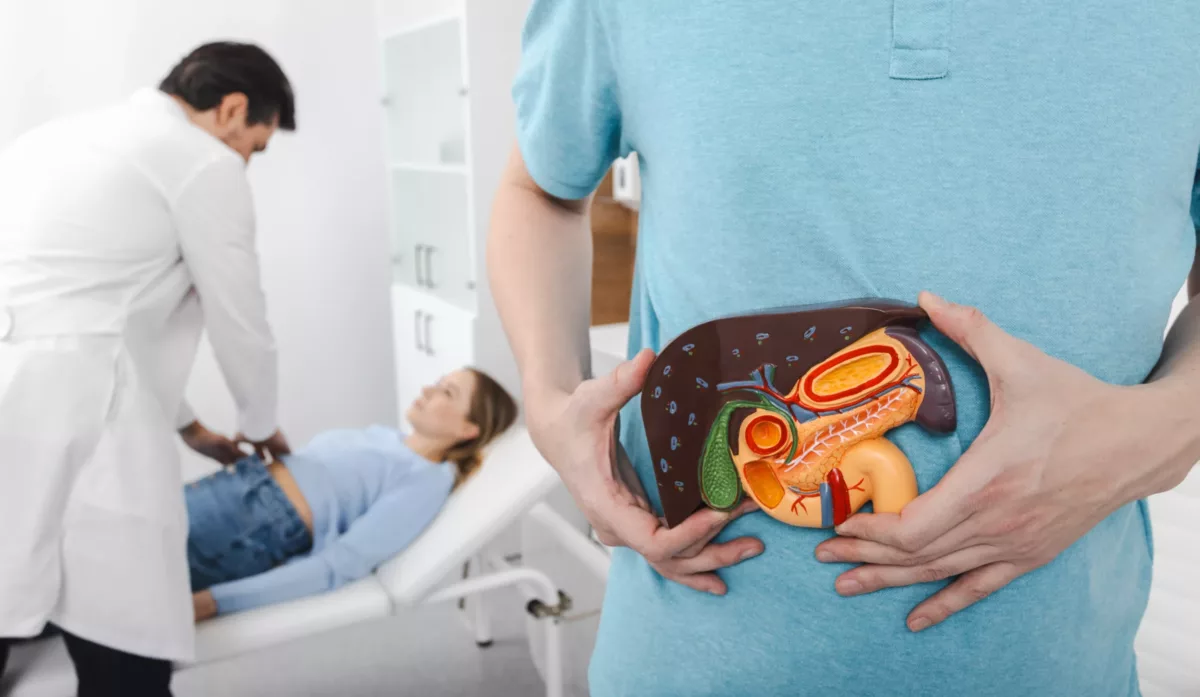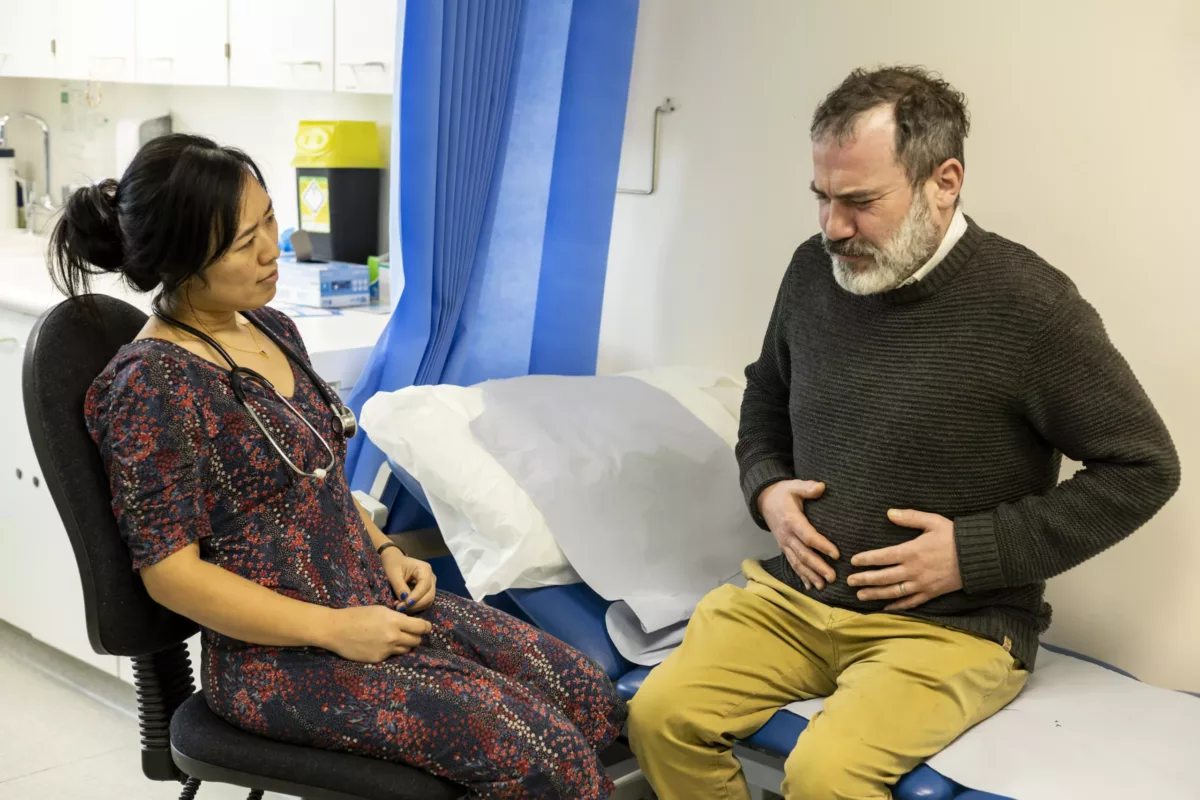When the acid produced in the liver goes back into the stomach and sometimes into the esophagus (the tube that carries food from the mouth to the stomach) is called bile reflux. In some cases, the gastric acid that is produced in the stomach may go backward into the esophagus along with bile. However, people experience gastric reflux due to a condition called gastroesophageal reflux disease (GERD). It is a serious condition that may cause irritation and inflammation of the esophagus tissue without treatment.
While gastric reflux can be managed with lifestyle and dietary changes, bile reflux usually requires treatment that involves medicines or surgery (in severe cases).
Symptoms
Sometimes, it is difficult to determine the exact cause of the symptoms. Multiple symptoms are similar to gastric acid reflux. Moreover, some people may develop both conditions. Check some examples of bile reflux symptoms below:
- Upper abdominal (belly) pain
- Frequent heartburn (a burning feeling in the chest)
- Nausea
- Vomiting
- Cough or hoarseness (sometimes)
- Unusual weight loss
It is recommended to see a doctor if you experience regular reflux symptoms or lose weight without trying. You should contact your doctor if you are following treatment for GERD but still experience symptoms. In such cases, you may need additional medicines for bile reflux.
Causes
Generally, bile is vital for digesting fats and eliminating worn-out red blood cells and certain toxins from the body. Bile is stored in the gallbladder but is produced in the liver. Thus, when you are eating something that even with a small amount of fat, it triggers the bile production. Thereafter, it is released through a small tube into the duodenum (upper part of the small bowel).
Bile Reflux into the Stomach
In normal circumstances, the food and bile mix in the duodenum and then pass to the small intestine. A heavy ring of muscle that is located at the outlet of the stomach is called the pyloric valve. It opens enough to release approximately an eighth of an ounce (3.75 milliliters) or less of liquefied food. However, it does not open enough to allow bile to reflux into the stomach.
Bile reflux often happens when this ring of muscle does not work properly, allowing bile to enter the stomach. Without treatment, this condition may lead to inflammation of the stomach lining.
Bile Reflux into the Esophagus
When the esophageal sphincter does not work properly, the bile and gastric acid can enter the esophagus. This is a valve between the stomach and esophagus that allows the food to pass into the stomach after it closes to prevent gastric acid from going backward. When the esophageal sphincter weakens, the bile and stomach acid can enter the esophagus.
Causes of Bile Reflux
- Surgery complications – Partial to total removal of the stomach for weight loss often causes bile reflux. This is one of the most common causes of this condition.
- Peptic ulcers – The pyloric valve may be blocked or may not open or close properly due to peptic ulcers. Increased gastric pressure may also allow the bile and stomach acid to enter the esophagus.
- Gallbladder surgery – Sometimes, people require surgery to remove the gallbladder. Thereafter, the risk of developing bile reflux increases significantly.
What Are The Possible Complications of Bile Reflux?
Usually, bile reflux is linked with an increased risk of stomach cancer. However, people with this condition may experience certain complications, especially without treatment. Examples include:
- GERD (gastroesophageal reflux disease) – A health condition in which gastric acid enters the esophagus. It may cause inflammation and irritation of the esophagus if it is not treated. Doctors usually suspect that GERD is caused by bile reflux when patients do not respond to powerful acid-suppressant medicines.
- Barrett’s esophagus – This is a chronic (long-term) and serious condition. When bile or stomach acid causes damage to people with this condition, it may lead to esophageal cancer.
- Esophageal cancer – Certain studies have shown that bile reflux and gastric acid reflux are linked with an increased risk of esophageal cancer.
Diagnosis
Physicians usually diagnose this condition by performing a physical examination and evaluation of your medical history. They may also ask you some questions about your symptoms. Usually, it is challenging to distinguish between acid reflux and bile reflux because most symptoms are similar. Check below for some tests used to confirm the condition:
- Endoscopy – During this procedure, doctors use a small and flexible tube (endoscope) that is passed down the throat to examine the esophagus. It helps identify peptic ulcers, stomach and esophagus inflammation, and may show bile.
- Ambulatory acid tests – These are specific tests used to determine when and for how long acid refluxes into the tube that carries food and liquid from the mouth to the stomach. Moreover, ambulatory acid tests may exclude acid reflux.
- Esophageal impedance – This test is often used when acid tests cannot detect regurgitated substances that are not acidic (such as bile). Generally, it measures the liquids or gas reflux into the esophagus.
Treatment
Physicians usually recommend lifestyle changes and medicines to treat acid reflux into the esophagus. However, bile reflux is usually harder to treat. Check below for some treatments often recommended by doctors for people with bile reflux:
- Ursodeoxycholic acid – This is a specific medicine used to reduce the frequency and severity of the symptoms.
- Sucralfate – This medicine is used to protect the stomach and esophagus lining from bile reflux.
- Bile acid sequestrants – This group of medicines is used to disrupt the circulation of bile. However, certain studies show that these medications are less effective than other treatments.
Surgery
This treatment option is often recommended by doctors when medicines and lifestyle changes are not effective. Below are some surgery types used to treat bile reflux and reduce the risk of complications:
- Diversion surgery – This procedure involves making a new connection for bile drainage. It may prevent bile from entering the stomach.
- Anti-reflux surgery – During this surgery, doctors will strengthen the lower esophageal sphincter, which may help prevent acid reflux. However, there is little evidence about anti-reflux surgery.
Home Remedies
The following tips may help ease the symptoms caused by acid or bile reflux. For example:
- Quit smoking or never begin – You should know that smoking increases stomach acid production and dries up saliva that provides protection to the esophagus.
- Eat smaller meals – It is advised to eat smaller but frequent meals to reduce pressure on the lower esophageal sphincter.
- Stay upright after a meal – It is not advised to lie down right after eating because it helps the stomach to empty.
- Limit fatty foods – Limit or avoid high-fat meals because they relax the esophageal sphincter.
- Limit or avoid alcoholic drinks – People who drink alcohol, especially in large amounts or every day, are more likely to experience heartburn and acid reflux.
- Regular physical exercise – Aim for at least 30 minutes of exercise per day because it helps lose excess body weight. Moreover, obesity also increases the risk of acid reflux.
Frequently Asked Questions
What causes bile to come up?
There are multiple causes that may lead to bile vomiting. For example, bile reflux, empty stomach vomiting, food poisoning, and certain health conditions (such as intestinal blockages or gallbladder problems).
What are the symptoms of a bile leak?
These include:
- Severe abdominal pain
- Nausea
- Vomiting
- Fever
- Jaundice (yellowing of the eyes and skin)
- Pruritus
- Dark urine
If any of the symptoms listed above happen, immediately visit a doctor.
Does stress cause bile reflux?
Yes, stress can trigger the symptoms of bile reflux or worsen them. If you have additional questions, ask your healthcare provider.




